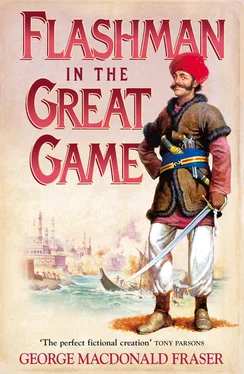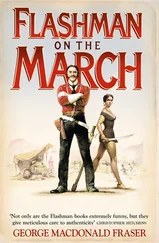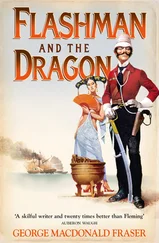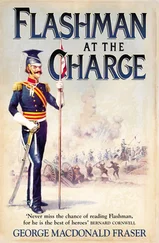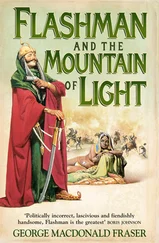I was kept waiting there a good hour before a major-domo came, salaaming, to lead me through the inner gate and up a narrow winding stair to the durbar room on the first storey; here again all was richness – splendid silk curtains on the walls, great chandeliers of purple crystal hanging from the carved and gilded ceiling, magnificent carpets on the floor (with good old Axminster there among the Persian, I noticed) and every kind of priceless ornament, gold and ivory, ebony and silverwork, scattered about. It would have been in damned bad taste if it hadn’t all been so bloody expensive, and the dozen or so men and women who lounged about on the couches and cushions were dressed to match; the ones down in the courtyard must have been their poor relations. Handsome as Hebe the women were, too – I was just running my eye over one alabaster beauty in tight scarlet trousers who was reclining on a shawl, playing with a parakeet, when a gong boomed somewhere, everyone stood up, and a fat little chap in a huge turban waddled in and announced that the durbar had begun. At which music began to play, and they all turned and bowed to the wall, which I suddenly realised wasn’t a wall at all, but a colossal ivory screen, fine as lace, that cut the room in two. Through it you could just make out movement in the space beyond, like shadows behind thick gauze; this was the Rani’s purdah screen, to keep out prying heathen eyes like mine.
I seemed to be first man in, for the chamberlain led me to a little gilt stool a few feet from the screen, and there I sat while he stood at one end of the screen and cried out my name, rank, decorations, and (it’s a fact) my London clubs; there was a murmur of voices beyond, and then he asked me what I wanted, or words to that effect. I replied, in Urdu, that I brought greetings from Queen Victoria, and a gift for the Rani from Her Majesty, if she would graciously accept it. (It was a perfectly hellish photograph of Victoria and Albert looking in apparent stupefaction at a book which the Prince of Wales was holding in an attitude of sullen defiance; all in a silver frame, too, and wrapped up in muslin.) I handed it over, the chamberlain passed it through, listened attentively, and then asked me who the fat child in the picture was. I told him, he relayed the glad news, and then announced that her highness was pleased to accept her sister-ruler’s gift – the effect was spoiled a trifle by a clatter from behind the screen which suggested the picture had fallen on the floor (or been thrown), but I just stroked my whiskers while the courtiers tittered behind me. It’s hell in the diplomatic, you know.
There was a further exchange of civilities, through the chamberlain, and then I asked for a private audience with the Rani; he replied that she never gave them. I explained that what I had to say was of mutual but private interest to Jhansi and the British government; he looked behind the screen for instructions, and then said hopefully:
‘Does that mean you have proposals for the restoration of her highness’s throne, the recognition of her adopted son, and the restitution of her property – all of which have been stolen from her by the Sirkar?’
Well, it didn’t, of course. ‘What I have to say is for her highness alone,’ says I, solemnly, and he stuck his head round the screen and conferred, before popping back.
‘There are such proposals?’ says he, and I said I could not talk in open durbar, at which there were sounds of rapid female muttering from behind the screen. The chamberlain asked what I could have to say that could not be said by Captain Skene, and I said politely that I could tell that to the Rani, and no other. He conferred again, and I tried to picture the other side of the screen, with the Rani, sharp-faced and thin in her silk shawl, muttering her instructions to him, and puzzled to myself what the odd persistent noise was that I could hear above the soft pipes of the hidden orchestra – a gentle, rhythmic swishing from beyond the screen, as though a huge fan were being used. And yet the room was cool and airy enough not to need one.
The chamberlain popped out again, looking stern, and said that her highness could see no reason for prolonging the interview; if I had nothing new from the Sirkar to impart to her, I was permitted to withdraw. So I got to my feet, clicked my heels, saluted the screen, picked up the second package which I had brought, thanked him and his mistress for their courtesy, and did a smart about-turn. But I hadn’t gone a yard before he stopped me.
‘The packet you carry,’ says he. ‘What is that?’
I’d been counting on this; I told him it was my own.
‘But it is wrapped as the gift to her highness was wrapped,’ says he. ‘Surely it also is a present.’
‘Yes,’ says I, slowly. ‘It was.’ He stared, was summoned behind the screen, and came out looking anxious.
‘Then you may leave it behind,’ says he.
I hesitated, weighing the packet in my hand, and shook my head. ‘No, sir,’ says I. ‘It was my own personal present, to her highness – but in my country we deliver such gifts face to face, as honouring both giver and receiver. By your leave,’ and I bowed again to the screen and walked away.
‘Wait, wait!’ cries he, so I did; the rhythmic sound from behind the screen had stopped now, and the female voice was talking quietly again. The chamberlain came out, red-faced, and to my astonishment he bustled everyone else from the room, shooing the silken ladies and gentlemen like geese. Then he turned to me, bowed, indicated the screen, and effaced himself through one of the archways, leaving me alone with my present in my hand. I listened a moment; the swishing sound had started again.
I paused to give my whiskers a twirl, stepped up to the end of the screen, and rapped on it with my knuckles. No reply. So I said: ‘Your highness?’, but there was nothing except that damned swishing. Well, here goes, I thought; this is what you came to India for, and you must be civil and adoring, for old Pam’s sake. I stepped round the screen, and halted as though I’d walked into a wall.
It wasn’t the gorgeously carved golden throne, or the splendour of the furniture which outshone even what I’d left, or the unexpected sensation of walking on the shimmering Chinese quilt on the floor. Nor was it the bewildering effect of the mirrored ceiling and walls, with their brilliantly coloured panels. The astonishing thing was that from the ceiling there hung, by silk ropes, a great cushioned swing, and sitting in it, wafting gently to and fro, was a girl – the only soul in the room. And such a girl – my first impression was of great, dark, almond eyes in a skin the colour of milky coffee, with a long straight nose above a firm red mouth and chin, and hair as black as night that hung in a jewelled tail down her back. She was dressed in a white silk bodice and sari which showed off the dusky satin of her bare arms and midriff, and on her head was a little white jewelled cap from which a single pearl swung on her forehead above the caste-mark.
I stood and gaped while she swung to and fro at least three times, and then she put a foot on the carpet and let the swing drag to a halt. She considered me, one smooth dusky arm up on the swing rope – and then I recognised her: she was the ladies’ maid who had been standing by the palankeen at the palace gate. The Rani’s maid? – then the lady of the palankeen must be …
‘Your mistress?’ says I. ‘Where is she?’
‘Mistress? I have no mistress,’ says she, tilting up her chin and looking down her nose at me. ‘I am Lakshmibai, Maharani of Jhansi.’
For a moment I didn’t believe it: I had become so used to picturing her over the past three months as a dried-up old shrew with skinny limbs that I just stood and gaped. 8And yet, as I looked at her, there couldn’t be any doubt: the richness of her clothes shouted royalty at you, and the carriage of her head, with its imperious dark eyes, told you as nothing else could that here was a woman who’d never asked permission in her life. There was strength in every line of her, too, for all her femininity – by George, I couldn’t remember when I’d seen bouncers like those, thrusting like pumpkins against the muslin of her blouse, which was open to the jewelled clasp at her breast bone – if it hadn’t been for a couple of discreetly embroidered flowers on either side, there would have been nothing at all concealed. I could only stand speechless before such queenly beauty, wondering what it would be like to tear the muslin aside, thrust your whiskers in between ’em, and go brrrrr!
Читать дальше
